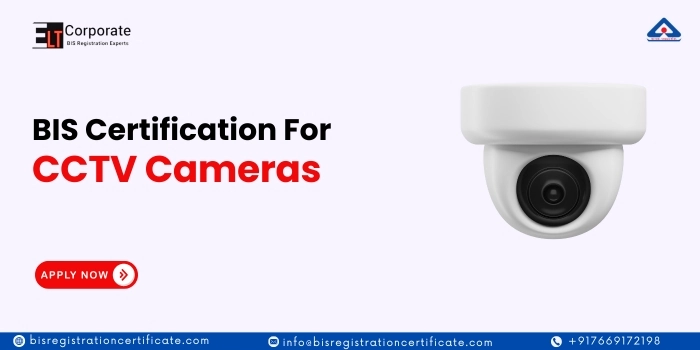In recent years, the use of CCTV cameras has become global across India. Serving as an essential tool for enhancing security and monitoring in various settings. To make sure that these devices meet the necessary safety and quality standards, the Bureau of Indian Standards has made it mandatory for CCTV cameras to obtain BIS certifications before they can be sold in the Indian market. In this blog post, you’ll know everything you need to know about BIS certificate for CCTV cameras, the process involved, and the benefits it offers to manufacturers and consumers.
Overview Of BIS Certification for CCTV Cameras IS 13252 (Part 1):2010
The BIS certificate for CCTV cameras falls under the IS 13252 (Part 1): 2010 standards, which specify the safety requirements for electronic equipment. This standard ensures that CCTV cameras meet mandatory safety criteria related to electrical safety, Radiation exposure, and operational stability. Compliance with IS 13252 (Part 1):2010 guarantees that CCTV cameras are safe for use in multiple environments, reducing risk related to electrical hazards and product failures.
Importance of BIS Certification for CCTV Cameras/ CCTV Recorders
BIS certificate is a mark of quality and safety, ensuring that electronic products, including CCTV cameras, follow specific standards. This certification is crucial for several reasons:
- Increased Safety: BIS certification ensures that CCTV cameras comply with safety requirements outlined in Indian Standards IS 13252 Part 1: 2010, reducing the risk of electrical hazards or malfunctions.
- Consumer Confidence: By obtaining a BIS certificate, manufacturers can boost consumer confidence in their products, which signifies that the products have been tested and certified to meet prescribed standards.
- Fair Market Practices: Standards and safety requirements create a level playing field for manufacturers, promoting fair competition in the Indian CCTV camera market.
New Security Requirements of BIS Certificate for CCTV Cameras
As of October 9, 2024, BIS Registretion for CCTV cameras also includes comprehensive security requirements to enhance protection against cyber threats. These requirements cover:
- Physical Security
- Access Control
- Network Encryption
- Secure Software Updates
- Penetration Testing
- Data Privacy
Benefits of Obtaining BIS Certification for CCTV Cameras/ CCTV Recorders
BIS Registration under IS 13252 (Part 1) 2010 offers several significant benefits:
- Safety Assurance: Satisfies safety criteria that can stop risks such as overheating or short circuits.
- Consumer Confidence: The BIS mark provides consumer satisfaction and security as it guarantees CCTV cameras’ top quality and reliability.
- Market Access: Only BIS-certified CCTV cameras are legally sold in the Indian market, which makes them compliant with national regulations.
- Quality Assurance: The certification process ensures the consistent production of high-quality commodities by the manufacturer.
- Competitive Advantage: Certified products tend to attract customers more, increasing the marketability of manufacturers.
Documents Required for BIS Registration for CCTV Cameras IS 13252 (Part 1):2010
To get BIS certificate for CCTV cameras under IS 13252 (Part 1):2010, the following documents are typically required:
- Filled CDF/CCL form
- Duly filled BIS application form
- Business License of manufacturing unit (English Translation + Local Language)
- The scope of business License (English Translation + Local Language)
- ISO certificate of the manufacturer
- Marking Lebel/Details of making on the products
- Authorization letter (If signatory person is other than the head of the manufacturing)
- Trade Mark certificate
- Trademark Authorization Letter (If ™ IS owned by someone other than the manufacturer)
- Authorization Indian Representative Company registration proof in India
- Photo ID of Authorized Indian Representative/Authorized Signatory
- Technical Specification Sheet of the product/user manual
Read More: Documents Required For BIS Certification
Process of Obtaining BIS Certification for CCTV Cameras/ CCTV Recorders
The process of BIS certificate for CCTV Cameras: 13252 (part 1):2010 is subject to variation depending on the geographic location of the manufacturing unit. Notably, the BIS registration process differs between domestic (Indian) manufacturers and foreign manufacturers.
Process For Foreign Manufacturer
- Appoint an Indian representative to represent the foreign manufacturer.
- Complete the online submission process.
- Arrange for sample testing at a BIS-approved laboratory.
- Apply online or offline along with the sample test report.
- BIS officials review and verify the application.
- Grant of License
Guidelines For The Nomination Of Authorized Indian Representatives
Foreign applicants must nominate an Authorized India Representative (AIR) for their operations in India to get a Bureau of Indian Standards Certificate. In case they don’t have a branch office in India.AIR as a local representative is responsible to submit and manage the application for certification and is available to answer the questions. Following guidelines to be followed by Foreign Manufacturers to appoint the Authorized India Representative (AIR)
- If the foreign manufacturer maintains a liaison or branch office in India, it will serve as the Authorized Indian Representative (AIR)
- If the foreign manufacturer lacks a liaison or branch office in India but the proprietor or registered user of the brand/trademark featured on the product is located in India, the owner will assume the role of AIR.
- Should the manufacturer not pass a liaison office in India and no proprietor or registered user of the brand/Trademark on the product be located in India, another entity will be designated as the Air.
Process for Domestic Manufacturer
- Initiate the online submission process.
- Conduct sample testing at a BIS-approved laboratory
- Apply, along with the sample test report, either online or offline
- The application is reviewed and verified by BIS Officials.
- Grant of License.
Read More: Get BIS Hallmark Registration
Points To Be Considered To Get BIS Certification For CCTV Cameras
Before applying for BIS certificate for CCTV cameras, manufacturers and importers should consider the following key points:
- Select a BIS-recognised testing organization and an experienced compliance professional who has the expertise and/or office in India that assist you.
- Another important thing you must consider while choosing a laboratory for testing of products is that the License of the lab should be valid and not suspended. At that time laboratory shall not be in the middle of getting audited.
- Before shipment of samples, make sure complete arrangements have been made for the entire shipment from your location to the testing laboratory’s door.
- All documents should be signed by the manufacturer, brand owner and Indian representative.
- In Construction, Data from product details shall be filled accurately, and in the Critical components list, product components information should be filled briefly and accurately.
- The test report is valid for 3 months/90 days. Before its expiry test report should be submitted to BIS in case. If you are unable to submit the reports to BIS, then you have to submit the new sample again for testing.
- All documents shall be ready before the testing of the sample.
- After the submission of documents, including the test report, India BIS normally takes about 15 days to approve the registration. In some cases, it may very like it can take 30 to 60 days, which is a more realistic timeline to expect.
Is BIS Certification Mandatory for CCTV Cameras?
A BIS certificate for CCTV cameras is an essential requirement in ensuring that the product conforms to guidelines set by the Bureau of Indian Standards. Compliance with the Indian Standards IS 13252 (Part 1): 2010, it is compulsory that CCTV cameras fully comply with IS and
Therefore, to be safe and secure in the eyes of consumers. The initiation of this certification will not only maintain the good quality of CCTV cameras in the Indian market but also boost consumer trust in the products they buy.
Conclusion
In conclusion, BIS certification is a critical step for manufacturers looking to enter the Indian market with CCTV cameras. It not only ensures compliance with safety and quality standards but also provides a competitive advantage and enhances consumer trust. As the demand for CCTV cameras continues to grow, following BIS certification requirements will remain essential for manufacturers seeking to capitalize on this trend in India.
What is the BIS for digital camera?
BIS for digital cameras ensures safety, quality, and performance standards in India, covering aspects like electrical safety and consumer protection.
Is STQC certification mandatory for CCTV cameras?
Yes, STQC certification is mandatory for CCTV cameras in India to ensure they meet quality, safety, and performance standards.
What is the BIS standard for CCTV cameras in India?
BIS specifies CCTV standards under IS 16910 (Part 1 & 2): 2018, which is based on IEC 62676 and covers technical and safety requirements for security systems.







